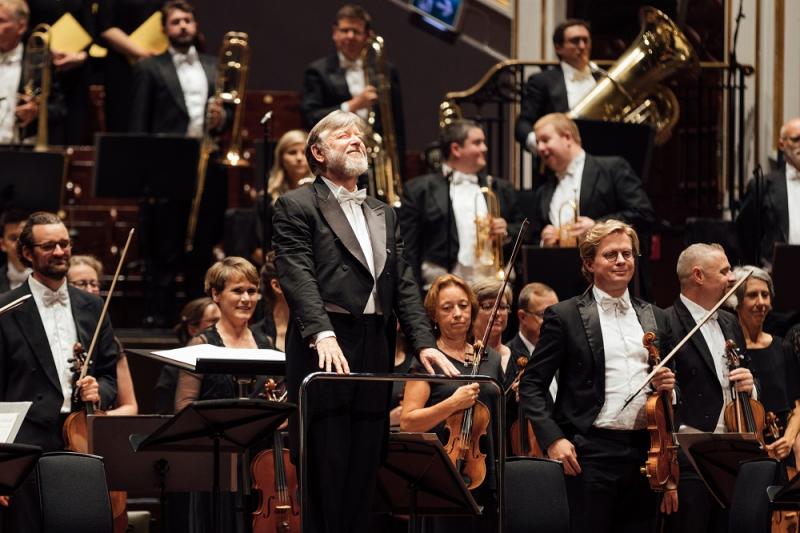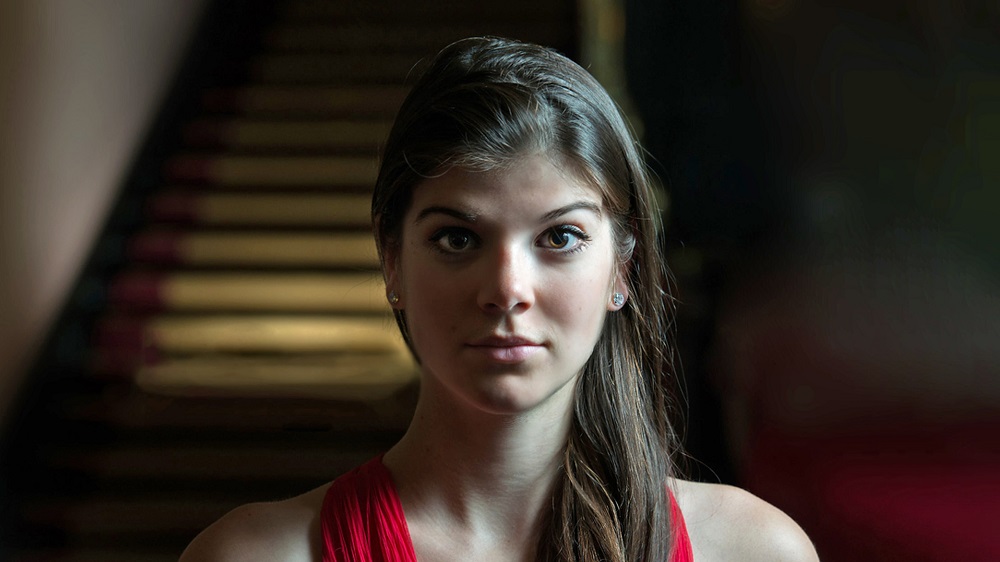RSNO, Davis, Usher Hall, Edinburgh review – warm Elgar, chilly Vaughan Williams, red hot playing | reviews, news & interviews
RSNO, Davis, Usher Hall, Edinburgh review – warm Elgar, chilly Vaughan Williams, red hot playing
RSNO, Davis, Usher Hall, Edinburgh review – warm Elgar, chilly Vaughan Williams, red hot playing
Sir Andrew returns to the podium for the first time in two years

“You’ll have to forgive me”, said Sir Andrew Davis at the start of this concert’s second half, “but I’m going to sit down.” As he lowered himself onto his podium stool, he let it slip that this was the first concert he had conducted in more than two years.
All the more excellent to have him back, then. Davis has had some first-class concerts with the Royal Scottish National Orchestra over the last decade or so, but none more memorable than their Walküre and Götterdämmerung as part of the Edinburgh International Festival’s 2016-2019 Ring cycle. He strikes sparks off the orchestra and they play magnificently for him, so I wasn’t surprised that this concert of English music brought out the best in them both. The strings sounded fantastic in Elgar’s Enigma Variations, and not just in “Nimrod”. The violins were light and wistful for Alice’s theme, then curt and precise for “HDSP”, and the lower strings sounded sensational in BGN’s variation. The winds sounded like the principal actors in a drama in “RBT” and “WN”, and the brass enjoyed the crash-bang-wallop of the composer’s self-portrait. This work, intrinsically bitty, is hard to hold together at the best of times, and Davis dealt with this by keeping the tempi flowing: “Nimrod” definitely didn’t hang about. There might have been a little less ebullience than I’d have wanted in the final pages, but perhaps that’s because we’d only reached the pause of the interval, not the climax of the evening’s end.  The sound for Vaughan Williams’ Sinfonia Antartica had all the grandeur that it needed, the opening theme seeming to spiral up constantly like a staircase in an MC Escher drawing. More than when I’ve heard this work before, my ear was constantly drawn to the sheer strangeness of the composer’s orchestration, with its xylophone ostinati and twinkling percussion against the backdrop of vast brass. It sounded more like an alien landscape than anything on planet earth, as though RVW was writing for Doctor Who rather then Scott of the Antarctic. The ethereal female chorus, and the ghostly but forceful mezzo of Katie Coventry (pictured above by Bill Knight), only reinforced this. I can’t say I’m a fully paid-up fan of this symphony: there’s a lot of mankind-dwarfed-by-relentless-nature and, outside of the Intermezzo movement, not an awful lot else. It was certainly played well, though, with power and scale to spare.
The sound for Vaughan Williams’ Sinfonia Antartica had all the grandeur that it needed, the opening theme seeming to spiral up constantly like a staircase in an MC Escher drawing. More than when I’ve heard this work before, my ear was constantly drawn to the sheer strangeness of the composer’s orchestration, with its xylophone ostinati and twinkling percussion against the backdrop of vast brass. It sounded more like an alien landscape than anything on planet earth, as though RVW was writing for Doctor Who rather then Scott of the Antarctic. The ethereal female chorus, and the ghostly but forceful mezzo of Katie Coventry (pictured above by Bill Knight), only reinforced this. I can’t say I’m a fully paid-up fan of this symphony: there’s a lot of mankind-dwarfed-by-relentless-nature and, outside of the Intermezzo movement, not an awful lot else. It was certainly played well, though, with power and scale to spare.
There was some of that in the premiere of Jasper Dommett’s Dreams of Isolation, too: a short piece that seemed to reflect more on loneliness than on solitude. Dommett’s orchestration was really impressive, deploying a similar diversity of orchestral palette to RVW. Icy strings and muted brass created a haunting texture through which came occasional stabs of energy, but the picture was tonal overall, with some impressively melodic string writing. The ending, in fact, with chilly high violins fading slowly into nothing, seemed like an answer to the Sinfonia Antartica. You’d almost think they’d planned it.
rating
Explore topics
Share this article
The future of Arts Journalism
You can stop theartsdesk.com closing!
We urgently need financing to survive. Our fundraising drive has thus far raised £49,000 but we need to reach £100,000 or we will be forced to close. Please contribute here: https://gofund.me/c3f6033d
And if you can forward this information to anyone who might assist, we’d be grateful.

Subscribe to theartsdesk.com
Thank you for continuing to read our work on theartsdesk.com. For unlimited access to every article in its entirety, including our archive of more than 15,000 pieces, we're asking for £5 per month or £40 per year. We feel it's a very good deal, and hope you do too.
To take a subscription now simply click here.
And if you're looking for that extra gift for a friend or family member, why not treat them to a theartsdesk.com gift subscription?
more Classical music
 Robin Holloway: Music's Odyssey review - lessons in composition
Broad and idiosyncratic survey of classical music is insightful but slightly indigestible
Robin Holloway: Music's Odyssey review - lessons in composition
Broad and idiosyncratic survey of classical music is insightful but slightly indigestible
 Bizet in 150th anniversary year: rich and rare French offerings from Palazzetto Bru Zane
Specialists in French romantic music unveil a treasure trove both live and on disc
Bizet in 150th anniversary year: rich and rare French offerings from Palazzetto Bru Zane
Specialists in French romantic music unveil a treasure trove both live and on disc
 Scottish Chamber Orchestra, Ibragimova, Queen’s Hall, Edinburgh review - rarities, novelties and drumrolls
A pity the SCO didn't pick a better showcase for a shining guest artist
Scottish Chamber Orchestra, Ibragimova, Queen’s Hall, Edinburgh review - rarities, novelties and drumrolls
A pity the SCO didn't pick a better showcase for a shining guest artist
 Kilsby, Parkes, Sinfonia of London, Wilson, Barbican review - string things zing and sing in expert hands
British masterpieces for strings plus other-worldly tenor and horn - and a muscular rarity
Kilsby, Parkes, Sinfonia of London, Wilson, Barbican review - string things zing and sing in expert hands
British masterpieces for strings plus other-worldly tenor and horn - and a muscular rarity
 From Historical to Hip-Hop, Classically Black Music Festival, Kings Place review - a cluster of impressive stars for the future
From quasi-Mozartian elegance to the gritty humour of a kitchen inspection
From Historical to Hip-Hop, Classically Black Music Festival, Kings Place review - a cluster of impressive stars for the future
From quasi-Mozartian elegance to the gritty humour of a kitchen inspection
 Shibe, LSO, Adès, Barbican review - gaudy and glorious new music alongside serene Sibelius
Adès’s passion makes persuasive case for the music he loves, both new and old
Shibe, LSO, Adès, Barbican review - gaudy and glorious new music alongside serene Sibelius
Adès’s passion makes persuasive case for the music he loves, both new and old
 Anja Mittermüller, Richard Fu, Wigmore Hall review - a glorious hall debut
The Austrian mezzo shines - at the age of 22
Anja Mittermüller, Richard Fu, Wigmore Hall review - a glorious hall debut
The Austrian mezzo shines - at the age of 22
 First Person: clarinettist Oliver Pashley on the new horizons of The Hermes Experiment's latest album
Compositions by members of this unusual quartet feature for the first time
First Person: clarinettist Oliver Pashley on the new horizons of The Hermes Experiment's latest album
Compositions by members of this unusual quartet feature for the first time
 Gesualdo Passione, Les Arts Florissants, Amala Dior Company, Barbican review - inspired collaboration excavates the music's humanity
At times it was like watching an anarchic religious procession
Gesualdo Passione, Les Arts Florissants, Amala Dior Company, Barbican review - inspired collaboration excavates the music's humanity
At times it was like watching an anarchic religious procession
 Classical CDs: Camels, concrete and cabaret
An influential American composer's 90th birthday box, plus British piano concertos and a father-and-son duo
Classical CDs: Camels, concrete and cabaret
An influential American composer's 90th birthday box, plus British piano concertos and a father-and-son duo
 Cockerham, Manchester Camerata, Sheen, Martin Harris Centre, Manchester review - re-enacting the dawn of modernism
Two UK premieres added to three miniatures from a seminal event of January 1914
Cockerham, Manchester Camerata, Sheen, Martin Harris Centre, Manchester review - re-enacting the dawn of modernism
Two UK premieres added to three miniatures from a seminal event of January 1914
 Kempf, Brno Philharmonic, Davies, Bridgewater Hall, Manchester review - European tradition meets American jazz
Bouncing Czechs enjoy their Gershwin and Brubeck alongside Janáček and Dvořák
Kempf, Brno Philharmonic, Davies, Bridgewater Hall, Manchester review - European tradition meets American jazz
Bouncing Czechs enjoy their Gershwin and Brubeck alongside Janáček and Dvořák

Add comment